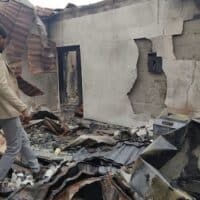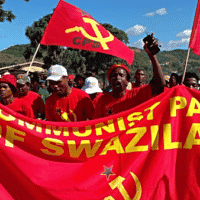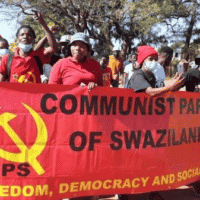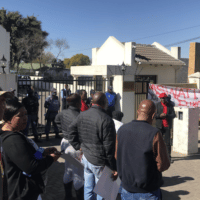-
Communist Party of Swaziland continues campaign to boycott ‘farcical’ elections despite arrests and torture
In Swaziland, only individuals approved by the local chiefs of King Mswati III can contest elections, and the parliament cannot hold the monarchy accountable. Pro-democracy activists have been calling for a boycott of the elections which are scheduled for August.
-
“Assassination of Thulani Maseko has killed prospects of peaceful struggle in Swaziland”
Activist and lawyer Thulani Maseko, who was at the forefront of Swaziland’s struggle for democracy, was gunned down hours after King Mswati’s threatening speech to pro-democracy activists. PUDEMO President Mlungisi Makhanya talks about Thulani’s struggle and what his killing means for the country.
-
Residence of Swazi pro-democracy leader bombed by alleged state-sponsored hit-squad
Mlungisi Makhanya, president of one of the largest pro-democracy political parties, PUDEMO, whose house was attacked “remains unshaken, defiant”.
-
King’s forces attack Communist Party of Swaziland members as protests continue
“I was held face down at gunpoint with my arms and legs bound behind for half an hour, while they fired shots and chased down my comrades,” CPS central committee member Vuyiswa Maseko told Peoples Dispatch.
-
Swaziland: Regime fears upsurge in resistance, intensifies persecution of leaders
The police attempted to arrest CPS member Bongi Nkambule, who was abducted and tortured by the police in March. When they failed to capture him, they took his wife into custody and beat her up in the police station. There has been an upsurge of resistance in Swaziland recently.
-
A prologue to the Swazi revolution, one year in the making
1 year ago, in June and July, a massive uprising led by Communists in Swaziland threatened to overthrow the last absolute monarchy in Africa. With the help of its imperialist allies, the Swazi monarchy brutally repressed this uprising, but they have only temporarily delayed the inevitable. One year later, we can reflect on the conditions that caused the revolution, its successes and missed opportunities, the role of imperialism in tipping the scales to a comprador bourgeoisie, and what has changed in the year since in Swaziland as revolutionary agitation continues.






